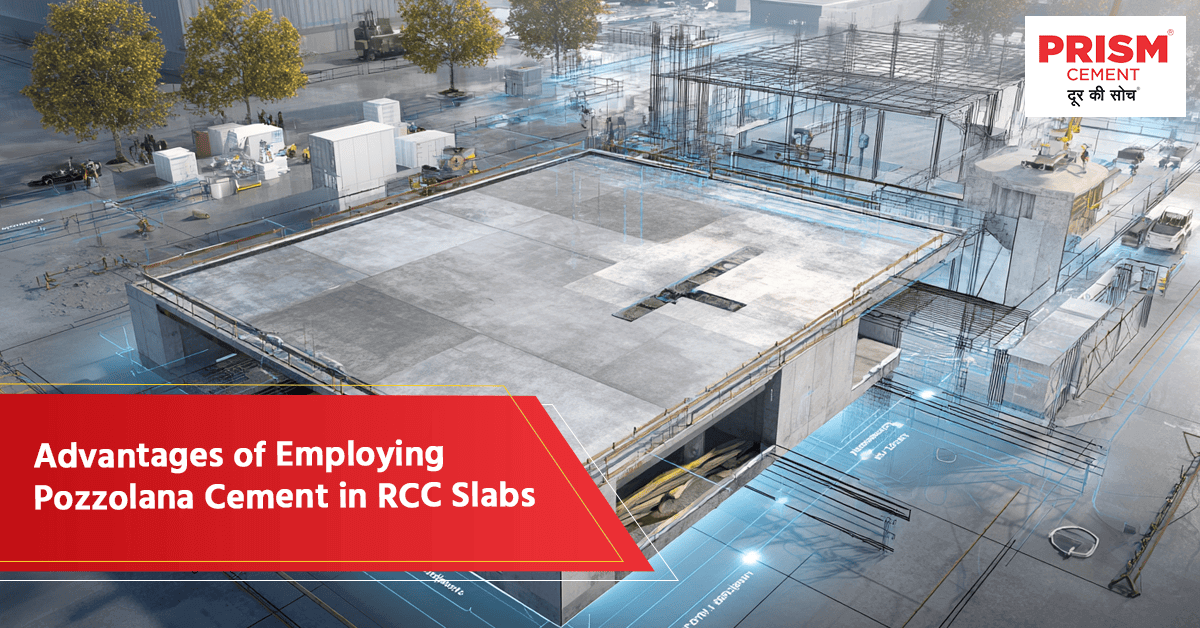Using the right materials is essential for ensuring the durability and performance of reinforced cement concrete (RCC) structures in modern construction. Among the various types of cement available, Portland Pozzolana Cement (PPC) has gained significant popularity—particularly in RCC slab construction. This blog explores the benefits of using PPC in RCC slabs, along with its key properties and practical applications. What is Portland Pozzolana Cement?
Portland Pozzolana Cement is a type of composite cement produced by grinding Portland clinker together with pozzolanic materials such as fly ash, volcanic ash or calcined clay. These pozzolanic materials react with the calcium hydroxide released during the hydration of Portland cement, forming additional Calcium Silicate Hydrate (CSH) gel. This secondary reaction enhances the strength, density and overall durability of the concrete.
Why Use Portland Pozzolana Cement in RCC Slabs?
The choice of using Portland Pozzolana Cement in RCC slabs is due to its potential to provide some major benefits over Ordinary Portland Cement. RCC slabs, as horizontal structural members, are subjected to various environmental stresses such as moisture, temperature variations, and chemical attacks. The use of this type of cement can greatly reduce these issues, resulting in stronger and more durable structures.
Advantages of Portland Pozzolana Cement in RCC Slabs
- Improved Durability: The pozzolanic reaction decreases the permeability of concrete so that it is more resistant to penetration by water and chemical attack. This is especially advantageous in RCC slabs subjected to harsh environments.
- Enhanced Chemical Resistance to Attack: The secondary CSH gel formation lowers the quantity of free calcium hydroxide, which is susceptible to chloride and sulfate attack. Portland Pozzolana Cement is, therefore, a better option for use in areas close to coastlines or industrial estates.
- Lower Heat of Hydration: It has a lower heat of hydration than OrdinaryPortland Cement. This reduces the chance of thermal cracking, particularly in large concrete pours such as RCC slabs.
- Gain in Long-Term Strength: The pozzolanic reaction is a slow process, which means that compressive strength develops gradually with time. This maintains the structural integrity of RCC slabs throughout their life.
- Smoothed Pore Structure: The pozzolanic reaction creates a smoother pore structure, thereby increasing the density and impermeability of the concrete. This is beneficial for better protection of cement reinforcement placed in the slab.
- Improved Workability: It tends to enhance the workability of concrete mixtures, facilitating easier placement and compaction, which is critical to achieving uniform density in RCC slabs. This is particularly beneficial when employing a cement pump.
- Environmental Benefits: Utilizing pozzolanic materials like fly ash significantly reduces the carbon footprint associated with cement production, thereby promoting sustainable construction practices.
Applications of Portland Pozzolana Cement in RCC Structures
This type of cement finds extensive applications in different RCC structures, such as:
- RCC slabs and beams
- Foundations and footings
- Bridges and dams
- Marine structures
- Sewage treatment plants
It is necessary to choose the best cement for slab work, and Portland Pozzolana Cement offers a sturdy solution.
Best Practices in Using Portland Pozzolana Cement in RCC Slabs
- Proper mixing and curing of the concrete must be ensured in order to make maximum use of the pozzolanic reaction.
- Employ proper water-cement ratios to attain specified strength and workability.
- Utilize sufficient cement reinforcement to strengthen the structural strength of the slab.
- Take into account environmental factors and possible chemical exposures while making a choice.
- In the case of employing a cement pump, see to it that the mix is pumpable.
Conclusion
The benefits of using Portland Pozzolana Cement in RCC slabs are many. Its capacity to increase durability, reinforce resistance to chemical attacks and lower heat of hydration ensures that it is a popular choice for contemporary construction. Through compliance with best practices, engineers and contractors can harness its advantages to construct strong and durable RCC structures.
FAQs
What are the main benefits of using Portland Pozzolana Cement in RCC slabs?
Principal benefits include improved durability, enhanced chemical resistance, lower heat of hydration, improved long-term strength, and a more refined pore system.
How does Portland Pozzolana Cement enhance the durability of RCC slabs?
It minimises the permeability of concrete and reduces the risk of water attack and chemical attack on the concrete, thus improving its durability.
Is Portland Pozzolana Cement applicable for all RCC slab construction works?
Yes, it can be used in large-scale RCC slab works, especially those subjected to severe environmental exposures.
How does Portland Pozzolana Cement improve crack resistance and chemical attack resistance in RCC slabs?
The lower heat of hydration reduces the chance of thermal cracking, and secondary CSH gelation diminishes the concentration of free calcium hydroxide, which is susceptible to chemical attack.
How does Portland Pozzolana Cement differ from Ordinary Portland Cement in RCC use?
It is a type of blended cement that contains pozzolanic materials and provides higher durability and chemical resistance than Ordinary Portland Cement.

